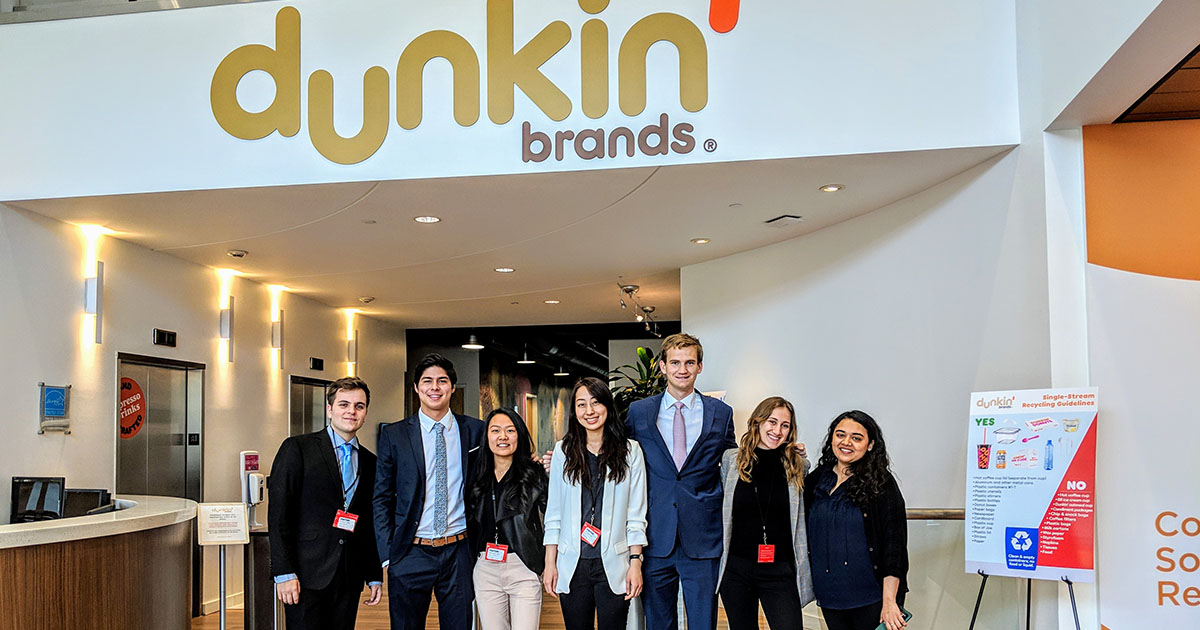Real Projects for Real Companies

When working with Babson students, Joseph Weintraub relishes the eureka moment.
That happens when students, faced with a real-world challenge, suddenly and joyfully discover that they are more than ready to tackle it. In that moment, all of their coursework, all of their learning experiences, click into place. “I can do this,” they realize.
As faculty director of the Management Consulting Field Experience, or MCFE as it’s commonly known, Weintraub has witnessed this empowering moment many times.
Increasing Demand
A quintessential Babson program, MCFE puts together teams of student consultants who, over the course of a semester, work with an organization to address a business challenge. “They’re doing real projects for real companies,” says Weintraub, a professor of management.
MCFE has been part of Babson for more than four decades, but lately it has experienced increased popularity. About 30 students were placed on a wait list for the program last fall, despite the fact that the College nearly doubled the number of MCFE teams it usually organizes, from 10 to 12 per semester to 18.
“I think students are craving a different kind of instruction,” says Arline MacCormack, the associate director of experiential programs in Babson’s Hoffman Family Undergraduate Center for Career Development. “They want to be actively involved in their learning. They want their work to be meaningful. They want to make a difference.”
Nonprofit and for-profit companies also are clamoring to work with MCFE students, proposing way more projects than the College can possibly accommodate. Recent companies involved with MCFE include Dunkin’ Brands, Puma, NESN, and the Boston Red Sox.
Companies Value Students’ Input
MCFE teams are typically made up of four to six undergraduates, who are evaluated not only on what they deliver to client companies but also on their professionalism.
Meanwhile, an MBA student serves as the MCFE team’s project leader. “The MBA student’s job is to develop the students,” says Weintraub, who has led the MCFE program for 25 years. “They sit down with students through the semester and offer feedback.”
In a typical semester, about 45 to 50 organizations apply to do projects with Babson students. Some companies value the input of Babson students so much that they’ve worked with the College multiple times. Clarkston Consulting has sponsored over a dozen teams, Puma about 20. Stacy Madison, known best as the founder of Stacy’s Pita Chips, has used MCFE teams for multiple entrepreneurial ventures.
The Red Sox, meanwhile, have sponsored about seven teams, and no surprise, those are popular ones with students. (David Sachs ’88, a former MCFE participant as a student and a generous donor to the program, was instrumental in securing the team’s involvement, says MacCormack.)
Amazing to See
Students on MCFE teams must be prepared to take on wide-ranging projects in areas that are far beyond their expertise. “They are taking these really complicated topics and becoming experts in them in 14 weeks,” MacCormack says.
MCFE teams consulting with Clarkson, for instance, have worked on projects about cotton crops and blockchain technology. They have helped the Red Sox with ballpark tours and consumer behavior at concession stands. With Wolfgang Puck, they made recommendations for a core menu for a restaurant.
To prepare for their projects, students are told to reach out to the “entire Babson network” for guidance, says MacCormack. Students connect with professors and campus librarians, with alumni, and with Babson’s writing and speech centers.
At the end of the semester, students give a comprehensive presentation to the company and answer whatever questions are thrown their way. MacCormack is impressed by their poise. “It’s amazing to see,” she says. “I am so proud every semester.”
Posted in Community
